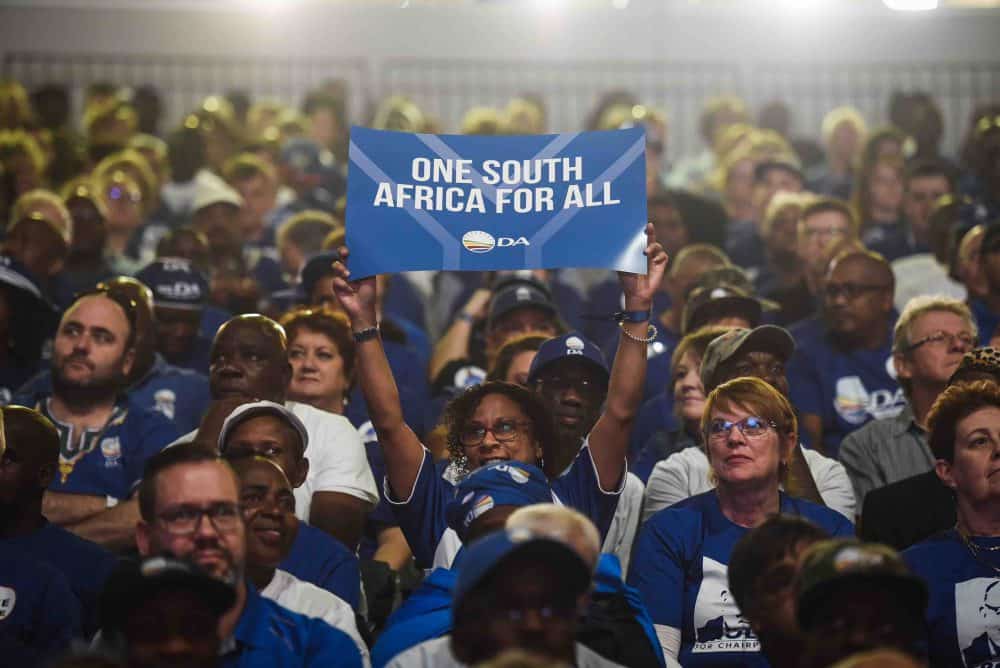MK party claims victory over DA to secure first major metro win
The candidate with the most votes will lead the party until its early congress in 2020.

DA supporters are seen celebrating during the opening ceremony of the Democratic Alliance's Federal Congress held at the Thwane Events Center, 7 April 2018, Pretoria. Picture: Jacques Nelles (This picture is for illustrative purposes only).
On Sunday at 2pm, the Democratic Alliance (DA) will be holding a media briefing at Nkukuleko House in Johannesburg to announce the results of the interim federal leader and chairperson positions.
160 DA members are expected to cast their votes.
The two candidates lobbying to become the party’s interim leader are John Steenhuisen and Makashule Gana.
The candidate with the most votes will lead the party until its early congress in 2020. This after former party leader Mmusi Maimane, as well as former federal chair Athol Trollip, resigned after Helen Zille was elected as the new federal council chairperson.
There are three candidates lobbying to become the federal chair, namely Western Cape finance MEC and deputy federal chairperson Ivan Meyer, MPL in the Gauteng legislature Khume Ramulifho, and Nomafrench Mbombo, DA Women’s Network leader and Western Cape health MEC.
According to political analyst Xolani Dube, Steenhuisen need not be a strong opposition leader, with political economy analyst Zamikhaya Mseti explaining that Steenhuisen has no choice but to rebrand the DA to return to its core values in principles. Even if this is at the expense of black members to gain more white, particular Afrikaans votes.
Should Steenhuisen become interim leader, the party would see all three top positions occupied by white members, with Helen Zille as federal council chairperson, and Natasha Mazzone as chief whip.
It is also said that Steenhuisen has an edge over fellow candidate and Maimane ally Gana, as he is already a senior and current parliamentary leader.
However, Steenhuisen as interim leader could see the party moving more to the right, says author on ANC politics Ralph Mathekga. This would imply that Steenhuisen would have to denounce Maimane’s policy approach, despite the former leader also being Steenhuisen’s mentor.
Steenhuisen has strongly denounced race-based policies, telling Eusebius McKaiser in an interview on 702, a statement that implicitly goes against Gana’s views that the “race issue” should be dealt with, he said in an eNCA interview.
This would align Steenhuisen with Helen Zille’s school of politics, something he denies.
“I don’t subscribe to the Zille school of politics … I’m a liberal, the DA is a liberal party,” he told McKaiser.
Gana, a member of the DA’s Gauteng Provincial Legislature, wants to not only deal with the country’s race issue, but gender issues as well.
In addition, he seeks to rebuild the “damaged brand” of the DA, and iron out contradictory race-based statements, notably ignoring the country’s intricate and complex race issues.
“To many black people, ‘blackness’ is irrevocably linked to their material conditions, which are more dire compared to their white compatriots. It absolutely does not hurt to acknowledge this predicament,” he wrote in the letter sent to party members ahead of Sunday’s election.
Gana said it was “hypocritical” to use black leaders to win votes while emphasising that race does not matter.
“The first question we have to ask is whether the DA can continue to propound a brand of politics that strains to emphasise that race does not matter, and yet recognises that in order to win elections, it has to have black leadership? I do not think this is sustainable because it is fundamentally hypocritical for more than one reason …”
Gana joined the DA in 2002 as a student, and was elected as a councillor in the Johannesburg Metro council in 2009.
In 2015, Gana challenged Athol Trollip for the federal chairperson position, and also campaigned to become the DA’s premier candidate this year, losing out to Solly Msimanga.
The DA’s closed elections will follow regulations set by the Electoral Commission of SA (IEC).
(Compiled by Nica Schreuder)
Additional reporting by News24 Wire, Eric Naki and Daniel Friedman
For more news your way, download The Citizen’s app for iOS and Android.
Download our app